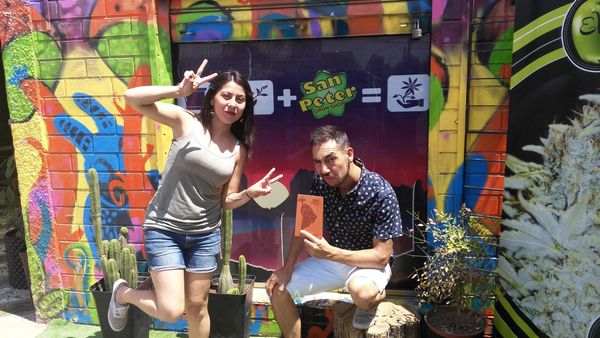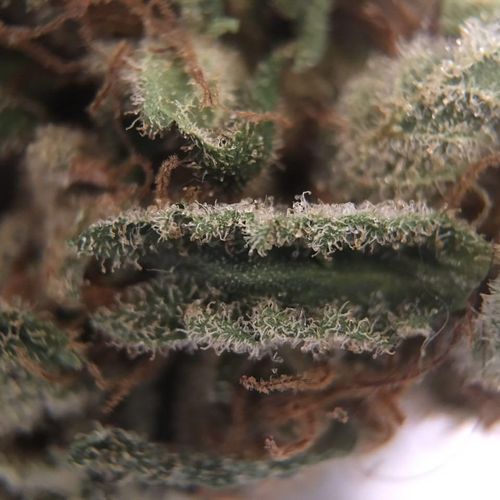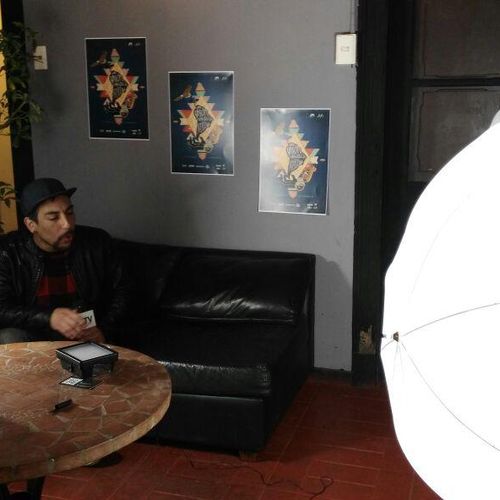- Three years ago Pedro Medina opened the San Peter Grow Shop along with Danya Sánchez, with the aim of changing cannabis consumption patterns in Santiago de Chile and allowing people to begin to cultivate high-quality marijuana.
- Proponents of teaching and explaining, they strive to try the strains their customers buy in order to learn more about them, thereby becoming ever more proficient growers. They recently won first place in the Outdoor Sativa category at the UCLA Cup (Latin American Cannabis Union) thanks to a Critical Jack strain grown by Pedro.

With 12 years of growing experience under his belt, Pedro Medina believes that the most important thing when cultivating cannabis is to get some sound advice, and for lovers of the green plant to enjoy access to high-quality marijuana. He recently claimed first place honours in the Outdoor Sativa category at the UCLA Cup for a Critical Jack plant that won over Chilean Sativa lovers.
How did you get into growing, and how have your techniques evolved?
I've been into gardening ever since I was younger. I'm 30 years old and started when I was 18. So, for 12 years I've been growing in a country with strict anti-cannabis laws, in which all the tools were lacking ... it was very difficult to produce winter crops, to get out of the summer season. I was looking for electrical appliances and they didn't want to sell them to me because I didn't have a company. It was very expensive. But everything has come along, and now that we are "grow shoppers" we have a lot of resources and tools, and it's not as hard as it was 12 years ago.
Can you tell us talk about your victory at the UCLA Cup? Why did you decide to enter in this category and with this strain?
We won in the Outdoor Sativa category. We also cultivate indoors, but we really like outdoor growing, though I must say that we do it in an urban setting. Here it is not grown on a flat area without any shade, but right by a house, alongside another, with shade, public street lighting, etc. It is even more complicated.
We tried out the Critical Jack and I had a very hard time getting it to bloom, because there is some street lighting that you cannot avoid and have to work around. It is just part of the work we have to do.
In this case, we used a hybrid – organic and mineral – cultivation substrate. We worked with vermicompost and, later, more technical tools, like Monster Bloom and Delta 9 to induce flowering.
Why do you think you won the cup? What makes Critical Jack so special?
We entered two strains: my Critical Jack and a slightly different Sativa. It seems that Chilean cannabis lovers liked the Critical more because it is an enveloping strain, with a more filling smoke and an oilier consistency and scent. The Chileans were not looking for a Sativa with a scent appealing to a more generic public, but rather, like I was saying, an oily, enveloping one. And that's what Critical Jack has.

What strains do you usually grow?
We love growing the strains that our customers are trying to see how these genetics work: if they are more prone to fungi, if they suffer from dehydration problems, etc.
As "grow shoppers," we try what we sell, and Dinafem has an excellent presence on the Chilean market. We love growing the strains that our customers are trying to see how these genetics work: if they are more prone to fungi, if they suffer from dehydration problems, etc. We also engage in cannabis education. We like to teach, and in this way attract more customers – and more first places, obviously (laughs).
We are now cultivating a new strain from Dinafem, Amnesia Kush, which is going great. We want to enter it at the High Life Cup. I also like to cultivate strains boasting a bit more history, like Nicole Kush, from Marimberos. We look for different genetics and aim for variety.

Tell us about the San Peter Grow Shop. Why did you open the store?
We lived in a comuna in which pressed cannabis was consumed. Here, in more affluent comunas, they were beginning to create grow shops, while the most marginal ones, more on the outskirts of Santiago, were being left out.
Thus, we wanted to transform consumption in the comuna so that it was of higher quality. Even as growers, when there were raids we were forced to turn to some dangerous elements and buy some low-quality joints. So, we opened the grow shop three years ago. And the first year we sold 2,000 seeds. Now, in a month, we will open another store in another comuna where the grass is also of very low quality. And we will continue to practice cannabis pedagogy, with a philosophy based on opening doors.
What is the legal situation like in the country now?
Things have not changed, legally speaking. They have been discussed in Parliament, and there are ambitious plans, but they are being thwarted by the president and the executive branch. They prefer to look the other way and ignore the fact that there are cannabis smokers out there who are consuming garbage. They don't see it as a public health problem.
Although the law has not changed, we know our rights. Before it was understood that growing was not a crime, but it was considered an act preliminary to a crime; that is, they didn't arrest you for growing per se, but rather if, according to the prosecutor and the judge, you were preparing to engage in trafficking.
Today entities like the Daya Foundation and this whole boom in grow shops have made cannabis use democratic. Thus, although the step towards regularisation has not been taken, they are enabling growing. In fact, it was always legal grow, but we didn't even know it. Last year the Supreme Court ruled in favour of growers: personal consumption, spiritual consumption (protected by the Chilean constitution), and even medical use, are legal. And cultivation is permitted.
What kind of customers do you have?
We have young customers, but also others who are 60, and up to 80 years old. And there are people who come in search of medical cannabis, who we help and counsel. There are some with very serious conditions. We have a small project that involves advising them and guiding them through the cultivation process. Producing medicinal oils is very easy, but they need help because, for example, there are moms with children suffering from epilepsy who have never smoked one joint. We used to tell them to grow, but they didn't know how. So, now we make it clear that what we are doing is advising them on medical cultivation. And when they are done producing the crop, we show them how to produce cannabis oil, and produce it for them.
What advice would you give to a grower who is just starting out?
The important thing is to turn to a responsible grow shop. You need to get a little more information, to be able to read the plants. The most important thing is to have a reputable shop you can count on for some guidance. That's what I would tell a grower who is just getting into this.



Comments from our readers
There are no comments yet. Would you like to be the first?
Leave a comment!Did you like this post?
Your opinion about our seeds is very important to us and can help other users a lot (your email address won't be made public).